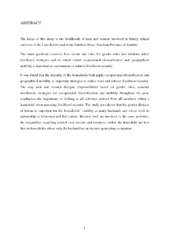| dc.contributor.author | Wold, Lisa Knatterud | eng |
| dc.date.accessioned | 2008-09-25T13:10:34Z | |
| dc.date.available | 2008-09-25T13:10:34Z | |
| dc.date.issued | 2007 | eng |
| dc.identifier.uri | https://hdl.handle.net/1956/2775 | |
| dc.description.abstract | The focus of this study is the livelihoods of men and women involved in fishery relatedactivities in the Lake Kariba and in the Zambezi River, Southern Province of Zambia.The main questions concerns how norms and rules for gender roles and relations affectlivelihood strategies and to which extent occupational diversification and geographicalmobility is important as mechanisms to achieve livelihood security.It was found that the majority of the households both apply occupational diversification andgeographical mobility as important strategies to reduce risks and achieve livelihood security.The way men and women delegate responsibilities based on gender roles, seasonallivelihoods, strategies for occupational diversification and mobility throughout the year,emphasises the importance of looking at all activities derived from all members within ahousehold when assessing livelihood security. The study also shows that the gender divisionof labour is important for the households viability as many husbands and wives work inpartnership as fishermen and fish traders. Because both are involved in the same activities,the inequalities regarding control over income and resources within the household are lessthan in households where only the husband has an income-generating occupation. | en_US |
| dc.language.iso | eng | eng |
| dc.publisher | The University of Bergen | eng |
| dc.title | Gender relations and household livelihood security in Lake Kariba fishing communities, Zambia | eng |
| dc.type | Master thesis | en_US |
| dc.rights.holder | The author | en_US |
| dc.rights.holder | Copyright the author. All rights reserved | en_US |
| dc.subject.nsi | VDP::Samfunnsvitenskap: 200::Samfunnsgeografi: 290 | nob |
